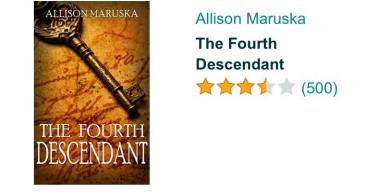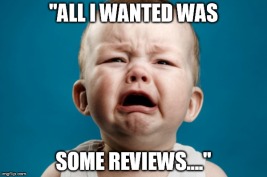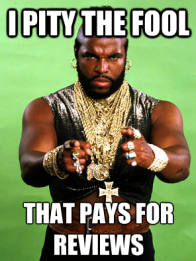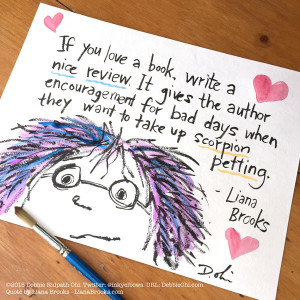When I published my first book twenty-one months ago (two years ago come February, so you don’t have to math), I didn’t know what to expect. I knew I’d sell some copies, probably my friends would read it, and it would get a handful reviews (hopefully good ones).
If you’ve followed the blog for a while, you know how things really went – 20,000 ebooks sold in the first year and thousands more sold since its first birthday.
 Today, it got its 500th Amazon review (thankfully, it was a 5-star review), which is an exciting milestone. I tried to find the average number of reviews for published books and didn’t get anywhere, but I know the majority of books see far fewer than 500, my other books included (so far. *knocks on wood*). So being on this side of 500, I thought I’d share a few things I’ve learned along the way, for authors just starting out or working to get reviews for their own books.
Today, it got its 500th Amazon review (thankfully, it was a 5-star review), which is an exciting milestone. I tried to find the average number of reviews for published books and didn’t get anywhere, but I know the majority of books see far fewer than 500, my other books included (so far. *knocks on wood*). So being on this side of 500, I thought I’d share a few things I’ve learned along the way, for authors just starting out or working to get reviews for their own books.
1. Getting reviews is freaking hard.
Look at the math here – let’s estimate 30,000 sales since release day, and there are 500 reviews. That’s a 1.67% review rate. Pretty crummy, but believe it or not, it’s normal. I’ve read to expect one review per 100 sales.
 When your book is just starting out, you’re pretty dependent on getting friends and followers to write reviews to help get the ball rolling. Asking betas to write reviews is a good way to start strong (I had twenty betas for this book). Whenever someone says they read your book, ask for a review. Maybe half of the people you ask will write one, and that’s probably a generous guess. But even if only half do, that’s a handful of reviews you wouldn’t have otherwise, and those help sell the book.
When your book is just starting out, you’re pretty dependent on getting friends and followers to write reviews to help get the ball rolling. Asking betas to write reviews is a good way to start strong (I had twenty betas for this book). Whenever someone says they read your book, ask for a review. Maybe half of the people you ask will write one, and that’s probably a generous guess. But even if only half do, that’s a handful of reviews you wouldn’t have otherwise, and those help sell the book.
People can be shy, and writing reviews takes time. They also don’t realize how important reviews are, especially to a new book/new author. If you’re a non-author type reading this post – this is why we may resort to shameless begging. If you’re an author type – don’t give up. Keep promoting and keep selling and keep asking for reviews. It’s the only way to get them.
2. Categories matter
I’m talking about the genre of your book – if it’s a mystery, list it as a mystery with other mysteries so readers aren’t surprised when they find your mystery in action/adventure. That leads to bad reviews because they wanted an action/adventure, not your mystery.
I’m speaking from direct experience here.
When Descendant was accepted by a well-known promotional service, they wanted to list it with action/adventure titles. I didn’t worry about it much – there is a little adventure in there, after all. Maybe the editors knew something I didn’t.
Well, the promo went exceptionally well, sales-wise. Then reviews started coming in. Some were good. An uncomfortable handful weren’t. A few were downright angry. And judging from the words written, it mostly had to do with the miscategorization.
3. The bad ones can be helpful.
 Bad reviews help in a couple of ways. First, if a book has only four- and five-star reviews, it appears the author has a bunch of friends and family reading the book – or worse, that the author may have purchased the reviews (which obviously aren’t legitimate). Negative reviews show that real readers who are not connected to the author are reading the book.
Bad reviews help in a couple of ways. First, if a book has only four- and five-star reviews, it appears the author has a bunch of friends and family reading the book – or worse, that the author may have purchased the reviews (which obviously aren’t legitimate). Negative reviews show that real readers who are not connected to the author are reading the book.
The other way they help is they often say things that help a potential reader decide to buy (or not). For example, if a book has a lot of bad language and a negative review says so, a reader sensitive to that will either read it and be prepared, or they’ll pass and save you another potential negative review. Or in the case of my book, a negative review can tell someone expecting a thriller that it’s really more of a mystery.
4. Some aren’t helpful at all (or so you think).
Some reviews say single words. That single word may even be misspelled. A reviewer may complain about a billing problem and punish your book for it.
I want to tell you a secret – even those reviews help, because they increase the overall number of reviews. That can mean the difference between Amazon adding your book to their mailings or not, and getting added means more sales. So you can thank the billing complainer in the end.
5. Reviews are about the book, not about you (even if they say otherwise).
I’ve had a negative reviewer or two verbally attack me in their reviews. I’ve had far more positive ones praise my efforts. Even in these, the reviewers are responding to the book, not to me personally. I put forth art into the world, and part of that deal is people will talk about it. And you know what? Good or bad, you want people to talk about it. When that happens, it gets onto more people’s radars and into more readers’ shopping carts.
All that said, I want to thank everyone who reviewed The Fourth Descendant (and/or my other books) from the bottom of my heart. You’re talking about them, and that helps me more than I can say. So I’ll let Liana Brooks say it for me.




Pingback: What Did You Like? 2016 In Review | Allison Maruska
Congrats for 500 plus reviews and for all your book sales! I never doubted it for a minute! 😉
LikeLiked by 1 person
Thanks, Gina! 🙂
LikeLike
Pingback: Best Fiction and Writing Blogs | M.C. Tuggle, Writer
Pingback: Featured Author Allison Maruska | Our Video Example
Agree with every word of this
LikeLiked by 1 person
Some handy tips here… Loved the read. I didn’t know negative reviews had some positive value. Won’t dread them again–as long as they remain a handful.
LikeLiked by 1 person
I follow another author on Facebook who posted a screenshot of his first 1-star review with the comment, “Look! I’m a legit author now!” He obviously already was, but it was funny.
LikeLike
🙂 Good advice for handling reviews. Congrats, btw! I wish I knew your secret to sales, reviews, and success! haha But really, you’ve got a way with words and a great personality, which I think both shine through in your writing. ❤
LikeLiked by 1 person
Aw, thanks Rachael! 🙂
LikeLiked by 1 person
Reblogged this on My Writing Blog and commented:
Very true! If you have read any of my books, please leave a review!
LikeLiked by 1 person
Thanks for the reblog!
LikeLike
Thanks for this. I am so nervous about getting reviews when I publish.
LikeLiked by 1 person
You’re welcome!
LikeLike
Reblogged this on daphne writes.
LikeLiked by 1 person
Thanks for the reblog! 🙂
LikeLike
Still looking for my 10th review. How wonderful to have 500. Congratulations.
LikeLiked by 1 person
Thanks! I have a book still looking for its 10th too. LOL. 😉
Hang in there.
LikeLiked by 1 person
Good reminder, “all publicity is good publicity.” 🙂
LikeLiked by 1 person
True story. 🙂
LikeLiked by 1 person
You know how on that TV show they have celebrities read the worst tweets they’ve ever received? We should do that with bad reviews.
Or not.
Congratulations on getting to 500 with The Fourth Descendant. It was a great book back when I was reading it in our critique group and I told you THEN that it would sell lots and lots of copies. See? I was right.
As often as not, the bad reviewer shows him/herself to be an ass. When I, as a shopper, see mostly good reviews and a few bad ones, it tells me the overall process is valid. I know we can’t please everybody and that some people are just jerks, so a small percentage of reviews are going to appear on every good product, too. (3% of Stephen King’s book The Shining are 1 and 2 star reviews. The Shining!!)
Sometimes a book’s marketing is too effective and people other than the targeted readers see it – and buy it because they blurb and cover are so good – and they don’t like it. But when 500 people have taken the time to write a review, and the overwhelming number of them are positive, then the few that aren’t positive are the ones with the issues.
LikeLiked by 2 people
I saw a vid of some authors trying the “reading mean reviews” thing. It was awkward. One of the authors was almost crying. But maybe if done JUST LIKE the mean tweets thing it could be funny.
And thanks! I’m thankful you were right about the lots and lots of copies thing. 😉 It wouldn’t have happened without the support and encouragement of several people, including you.
LikeLiked by 1 person
I know. I put comments like that out there so you have to thank me publicly
LikeLiked by 1 person
Reblogged this on Dan Alatorre – AUTHOR.
LikeLiked by 1 person
Thanks for the reblog!
LikeLiked by 1 person
You touched on it here, but you could probably talk more about all the stuff you do that make up the hard work involved in getting people to write reviews. I bet a lot of things you do now as second nature weren’t things you did when you first started writing – and some are probably even things I don’t know to do!
LikeLiked by 1 person
so nice to read a success story fro a change! So well done you!
LikeLiked by 2 people
Thanks! 😁
LikeLiked by 2 people
you mentioned a well known promotion company, can you say which one?
LikeLiked by 1 person
I refrained from naming them in a public space because I would like to list there again. Send me a message through the Contact Me page and I’ll fill you in.
LikeLiked by 1 person
Right!
LikeLike
Reblogged this on Anita Dawes & Jaye Marie.
LikeLiked by 2 people